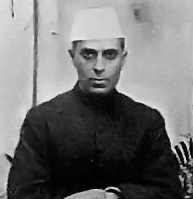If the title led you to think that the post would be about George W. Bush's insanely Manichean view of the world, well, it is not.
"Are you with us, or against us?" was apparently pretty much the question that President Eisenhower's Secretary of State, John Foster Dulles asked India's then prime minister, Jawaharlal Nehru.
Nehru was a champion of maintaining an identity that was not always allied with the the US or the USSR--the idea that later became the Non-Aligned Movement--and was actively encouraging the newly independent countries to join him in that flavor of international relations. And given Nehru's influential standing among the leaders of the post-colonial nations, it is easy to understand why Dulles was trying his best to get Nehru over to his side.
So, what was Nehru's response to this question of "are you with us, or against us?"
Get this; his reply was "yes."
In a Book-TV airing--a repeat from five years ago--Shashi Tharoor described this and more from Nehru's life. Tharoor explained what Nehru meant by that "yes": there was not going to be any wholesale siding with the US, but that on a case by case basis India would decide whether to support or oppose America.
The US decided it could not count on a democratic India as its ally in the Cold War against the evil Soviet empire. And, therefore, it sided the neighboring country that went about systematically gutting any trace of democratic institutions. Realpolitik!
Anyway, back to Nehru. He had his flaws--personal and political. But, there is no denying that if not for his efforts, democracy might not have taken a strong hold in India.
Like George Washington here, Nehru had an overwhelming support--not only soon after independence, but for years later too. But, again, like Washington he rejected any notion that he had any divine right to rule over the country. Thus, while Pakistan fell to military generals, and many other newly independent countries slipped into the hands of dictators and maniacs, Nehru went about his business of cultivating democracy--even to the extent of growing an opposition when there was none.
Back in India, my father still retains with him an autographed photograph of Nehru--a symbol of how much Nehru was loved.
Too bad that even Nehru's daughter, Indira, would later ditch the ideals that Nehru and Gandhi fought for. Worse, she pretty much cleared the path for opportunism and cheap electoral victories that have nothing to do with any vision of principles.
Of course, opportunism and cheap electoral victories is the story of American politics too :(

4 comments:
Can't agree more to the views on Indira.
Hey Gowri, good to see you here, man.
Let us see if Ramesh also spots you here :)
Wow Gowri - I can barely recognise you from the photo. Ah well; how we have changed.
Yes, Nehru was a demi god in those days and could, in the eyes of the people, do no wrong. However, methinks, India internally would have got to a better off start if Patel had become the PM, and lived longer. History is , of course, full of If Only's.
There is no doubt that the decadence of Indian politics started with Indira Gandhi. She is responsible for starting its degeneration, and , everybodyelse piled on.
Hey Gowri, join us in the fun as we chat and joke about some serious stuff ...
Ramesh blogs at http://indigoite.blogspot.com/
When Ramesh comments, I usually continue the conversations via email ... but, this time, I intentionally chose this format when Gowri commented, in order to make sure that you both were aware of each other's cyber-presence, and to also pass along the URL for Ramesh's blog.
Gowri, it appears that you had some ideas for blogging and kind of ditched that effort ... one other avenue is this: if you decide that you want to share something via a blog post, you can always guest-post here
Post a Comment